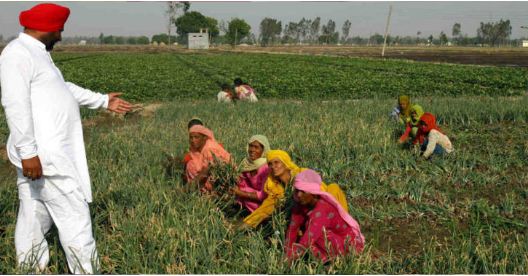In a decision that would have a great impact on the agricultural sector of the country, the Modi government has decided to directly pay the Minimum Support Price in the bank account of the farmers. So far, the Food Corporation of India (FCI), which is responsible for food procurement, used to pay to farmers through arhtiyas who charged a 2.5 per cent commission for facilitating the payments.
However, given the fact now the state governments have the data about the land records of the farmers, the MSP amount can be directly transferred to the bank accounts of the beneficiaries through DBT. This will save the 2.5 per cent commission that arhtiyas (middlemen) get from the Union government which will translate into a total saving of thousands of crores of rupees for FCI.
Moreover, the arhtiyas also charge money to the farmers by fooling them in the name of the quality of grains and through various other methods. Therefore, the farmers would also save a lot of money, and the role of arhtiyas would be removed altogether.
The North zonal office of FCI, based in Noida, reportedly said that furnishing land record is compulsory for selling the food to the company during the Rabi Marketing Season (RMS) 2021-22. “It is requested to share data of land records and convey to the office where to find it so that FCI shall verify land records of farmers during RMS 2021-22 with regard to FCI’s own purchase,” said FCI in a statement.
This will further weaken the ongoing farmers’ protests because the majority of the protestors are there at the behest (and money) of the arhtiyas rather than for the real issues of the farmers. Arhtiyas (middlemen between the government and farmers in the food procurement system) are a powerful force throughout the country. They have opposed all the reforms proposed/implemented by the union/state government to make the food procurement system transparent – be it direct transfer of payments or digital technology-enabled mandis.
With the help of state-of-art technology, the arhtiyas can be cut down and the government can directly deal with farmers in the transfer of subsidies as well as grain procurement for PDS. However, the middlemen across the country have opposed all the reforms tooth and nail because it threatens their existence.
The arhtiyas ecosystem is so strong, especially in the states like Punjab and Haryana, that the Punjab government is opposing the direct payment of the MSP to the farmers, and said they are legally protected. “The practice of commission payable to arhtiyas is governed by statutory provisions of the Punjab Agriculture Produce Marketing Act, 1961, and the rules framed thereunder,” said a Punjab government official.
Punjab government refused to share the data of the land record to FCI, but the corporation has written to the director of food, civil supplies, and consumer affairs, for the data. Once the data is supplied, the farmers will directly get money into their bank accounts, and they will themselves oppose the protestors who are standing against their prosperity.
The farmers of Punjab are suffering not because the Union government has brought the farm laws but because these laws are not even fully operational yet and due to the lack of courage in the successive Congress governments to implement reforms and remove the arhtiyas from the system. Within a few months, the farmers will see the real benefits of the agriculture reforms when they get money directly into their bank accounts and would thank the Modi government for these reforms.
